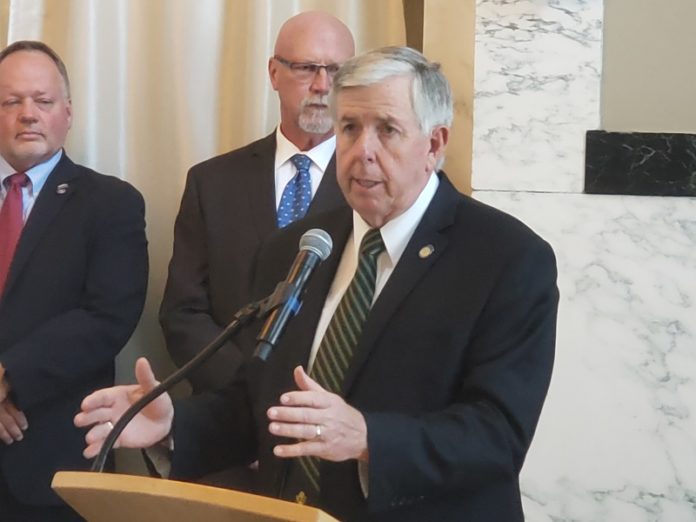(Updated to reflect comments from the chair of the Senate Commerce Committee and Overland Park Chamber of Commerce officials)
Missouri Gov. Mike Parson on Tuesday morning signed a bill intended to stop businesses from using state tax incentives to hopscotch back and forth across the state line.
The bill, signed at Kansas City’s Union Station, bars the state from extending tax breaks to businesses relocating to Missouri border counties from Kansas border counties.
The bill specifically identifies the Kansas border counties as Johnson, Wyandotte and Miami. In Missouri, the bill applies to Jackson, Platte, Clay and Cass counties.
“This is about being competitive with real competitors,” Parson said.
“It is so important to really be able to put things into play…that (are) really going to make a difference for years to come for the Kansas City region,” he said.
The bill is intended to bring an end to businesses jumping back and forth across the state line with tax incentives.
Estimates indicate that Kansas and Missouri have spent more than $300 million during the last decade luring businesses back and forth across the state line.
“Resolving this issue has been a longtime priority for the KC Chamber and for many in our business community,” said Joe Reardon, president and chief executive officer of the Greater Kansas City Chamber of Commerce.
“We believe our true competition is not between us,” he said. “But it’s with other regions like Dallas, Denver, Nashville.”
The bill has a significant caveat.
It depends on Kansas taking similar action, mostly likely through an administrative directive issued by Gov. Laura Kelly.
The law would expire Aug. 28, 2021, unless provisions of the border war truce are in effect.
Missouri passed a law in 2014 that prohibited the use of state incentives to attract businesses from Douglas, Johnson, Miami and Wyandotte counties. The latest bill does not include Douglas.
However, Kansas was required to enact similar legislation promising not to recruit businesses from Missouri border counties. Kansas later rejected the plan.
Economic development experts said that Kelly has the power to administratively act to follow Missouri’s legislation without needing legislative approval.
Whether the governor would act unilaterally was immediately unclear.
“For years, Kansas and Missouri have irresponsibly spent economic development resources luring jobs back and forth across the border with little actual job growth for either state,” Kelly said in a statement.
Blake Schreck, president of the Lenexa Chamber Commerce, said the bill signed Tuesday is essentially a placeholder until Kansas moves forward with an administrative directive.
“Generally, this would be a good deal,” he said. “We’ll see where it goes from here.”
Republican Sen. Julia Lynn, chair of the Senate Commerce Committee, urged the governor not to issue an executive order matching the Missouri law.
She said the governor would violate her commitment to transparency by moving forward with an executive order without getting input from the Kansas Legislature.
“Our Legislature should and absolutely must have an opportunity to vet the issue and come up with a Kansas solution,” Lynn said.
“I think it would put the governor in a very precarious position with the Legislature by not allowing a transparent and open discussion for our entire state on the issue,” she said.
The Overland Park Chamber of Commerce, meanwhile, said it wants to see any agreement with Missouri use net job growth as a factor.
“Our issue is with companies that go back and forth just to sign leases and don’t actually add jobs,” said Beth Johnson, senior vice president of economic development for the Overland Park chamber.
“If they’re going to move and they buy real estate and invest, I’m good with that,” Johnson said. “If they’re going to move because they’re building a brand new building, great. Let’s talk about it.
“But if they’re just moving for a five-year lease and in five years they’re going to jump back again, those shouldn’t be our concern.”













